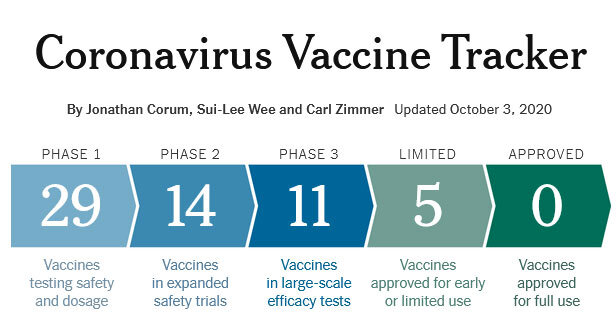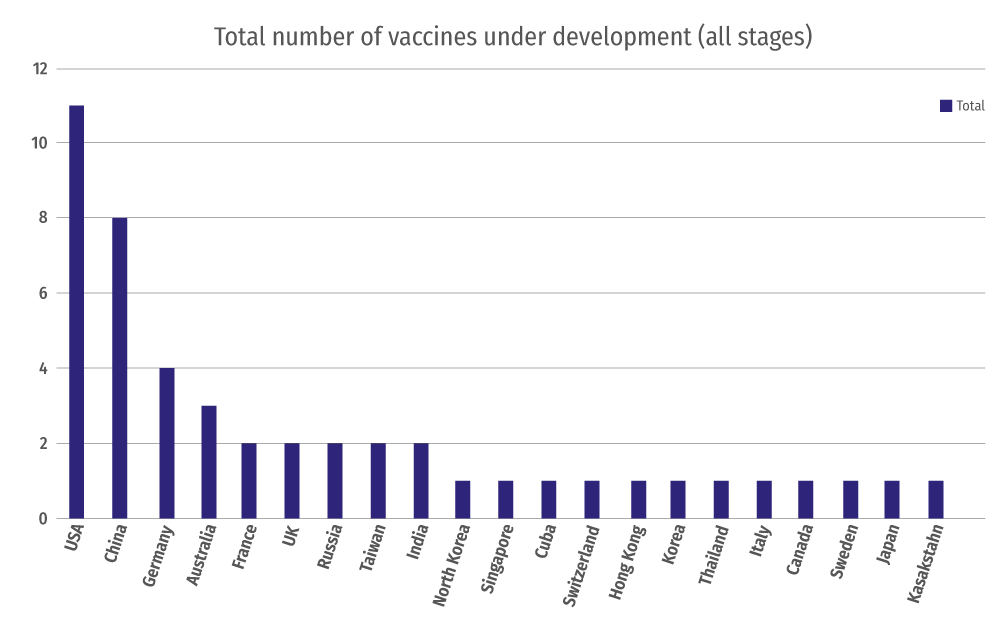The Great Vaccine Race: How China got ahead
By Erik Wernberg-Tougaard
China may become the first country to develop a vaccine for the global corona pandemic. It has predicted that it will have a vaccine ready around November or December and now has at least three big companies that are at the front of the global vaccine race.
Corona has basically been eradicated in the country, and the Chinese government is now looking to other countries for patients to test the vaccines and conduct clinical trials on. Both China and Russia have approved vaccines without waiting for the 3rd and most extensive testing phase to take place and experts therefore worry about the side effects and the long-term impact of the vaccines.
With things largely back to normal in the epicentre of the corona outbreak, China is now betting on becoming the first country to find a cure to the deadly corona pandemic. Chinese vaccine developers are already preparing for mass production, even though clinical trials still need to be carried out on a number of Chinese vaccines against Covid-19. China has already started testing its vaccines on both military personnel, frontline health workers and flight attendants. And even one of China’s top scientists, Wu Guizhen of China’s Center for Disease Control and Prevention, has inoculated herself to prove the efficacy of the vaccine. With such pace and speed, China may very well become the first country to develop a vaccine.
China and USA lead on vaccine development
Winning the global vaccine race is a big demonstration of power, and there is no doubt that it is in both China’s and the US’s interest to be the first to develop a successful vaccine. An effective vaccine is key not only to control the pandemic, but also to open up societies and get the economy up and running again. As it goes for the size of economies and big tech companies, China and US are also leading when it comes to vaccines. Especially China, however, is increasingly in charge of some of the most promising vaccine developers. Below we take a closer look at some of the leading companies within the vaccine race.
Graphic from www.nytimes.com
As the table above shows, there are currently 11 vaccine developers that are in the final testing stage, also known as ‘phase 3’. It is in this stage that the vaccines are tested on large groups of people, to make sure the vaccines are safe and effective.
So far, it is only China and Russia that have reached the approval stage ‘approved for early or limited use’, with four Chinese and one Russian vaccine receiving approval. However, both countries have been criticised for being too fast with their approvals, as the approvals which normally take up to six months, have been reduced to only a few weeks.
According to the New York Times Vaccine Tracker, China has four vaccines that have entered phase 3. The companies behind the vaccines are CanSion Biologics, Sinovac Biotech and Sinopharm. Sinopharm is currently responsible for undertaking clinical trials for two vaccines, developed by Wuhan Institute of Biological Products og Beijing Institute of Biological Products respectively. The companies listed above are all developing vaccines that are being tested overseas at the moment.
Data fra Global Vaccine Tracker, New York Times
China’s clinical tests goes international
One of the big questions around China’s vaccine, is how it will be distributed and to whom. As there are no large scale Covid-19 infections in China, China has set up agreements with countries around the world to partner with Chinese vaccine developers for the last stage of the human trials. Among others, China’s phase III testing is already taking place in Brazil and the United Arab Emirates. For instance, the Chinese vaccine developer China National Biotech Group (CNBG) has already inoculated over 35,000 people in the United Arab Emirates. Other countries where China is conducting phase three trials include Turkey, Bangladesh and Indonesia.
Chinese vaccine developers are also getting ready to distribute its vaccines globally. For instance, the Indonesian government has recently signed a contract with Sinovac for the supply, local production and technology licensing of its vaccine, CoronaVac. According to the agreement, Sinovac will supply 40 million doses of semi-finished CoronaVac products to Indonesia before March 2021.
While a Chinese vaccine is gaining traction, experts still see it as less likely for the vaccine to come to the US and EU, where the regulatory environment is different. US and EU use the Stringent Regulatory Agreement (SRA) system to regulate pharmaceutical products, whereas most developing countries, such as India or China, use the National Regulatory Authority (NRA) system. With the tests going international, the question is now if China will receive the WHO’s pre-qualification, which will make it possible to sell the vaccine globally.
Reputational risk may impede China’s success
While Beijing is increasingly showing confidence in its products, the United States’ top infectious disease official, Anthony Fauci, has said that it is unlikely for America to use vaccines developed by either China or Russia, due to the non-transparent nature of their regulatory systems.
And this scepticism is not unjustified. China is historically known for poor food and health security, with a number of vaccine scandals over the last few years to underscore this. The most well-known of these is the melanin scandal in 2008, where almost 300,000 children fell sick and at least six died after consuming formula milk tainted with melamine.
More recently, Changchun Changsheng Bio-technology sold more than 250,000 DPT vaccines in Shandong province before finding out that many of them were not effective.
The vaccines were given to babies as young as three months old, and later it was also revealed that the company had forged its data for its rabies vaccines. The company was fined 9.1 billion yuan, but the damage on the Chinese people’s trust in vaccines was already done. Cases such as these are part of the reason why many Chinese people still prefer imported vaccines over domestic ones.
What about China’s vaccine diplomacy
There has been an increasing fear that China will only sell its vaccines to countries, that adhere to the ‘party line’. China has indicated that African countries and South East Asian countries will be some of the first to get the vaccine. Many of the countries in these parts of the world are important to Xi Jinping’s ‘Belt and Road Initiative’, and experts therefore worry that China is using its vaccines to gain political leverage. This was also seen during the start of the pandemic, where China heavily engaged in what became known as “mask diplomacy”, by sending out protective equipment and medical supplies to countries such as Italy and Serbia and also Denmark.
However, on Sept. 30, China’s Foreign Ministry spokesperson, Wang Wenbin, told China’s official news bureau Xinhua that China will provide the vaccine to the rest of the world at a “fair and reasonable price”. He underscored that China would see the vaccine as a ‘global public good’, something that resonated with Xi Jinping’s statement back in May.
Who will have priority to the vaccine, and how it will be distributed is hard to tell, but there is no doubt, that China is a country we should follow closely in that regard.





